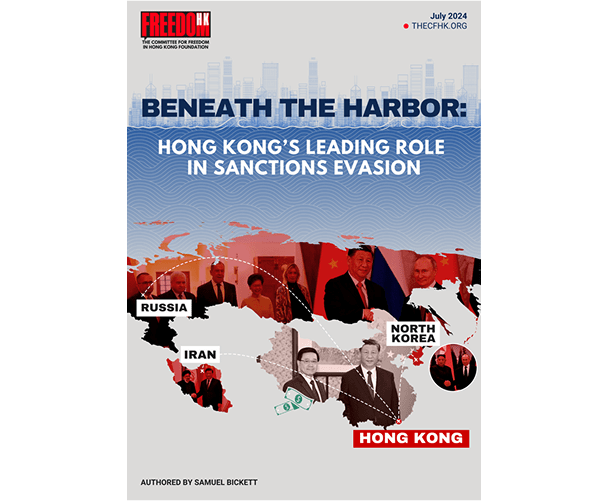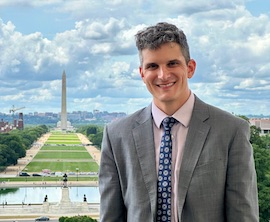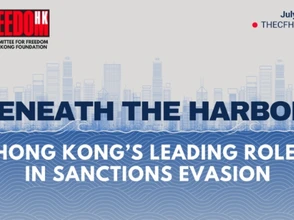
Beneath the Harbor
Hong Kong until recently was considered a top-tier global financial center, its influence rivalled only by New York and London. Governed by rule of law, its compliance with international standards made it a trusted partner to the world. But all that has changed. With China’s assertion of overall political control, Hong Kong now serves Beijing’s priorities, even at the cost of global security. Hong Kong’s financial and trade strengths have been co-opted by autocrats; they are now used not to connect the globe for good, but to undermine stability and subvert international laws and norms.
This report examines a critical aspect of this phenomenon: Hong Kong’s central role in facilitating the transfer of money and restricted technology to Russia, Iran, and North Korea, three countries that the international community has sanctioned for their destabilizing actions. In the growing alliance between these three countries and China, our investigation shows that in many ways, Hong Kong is the hub and these countries are the spokes. Through detailed analysis and investigation using publicly available data collected by C4ADS, a Washington, D.C.-based global security nonprofit, as well as corporate records and other open-source data, we highlight the indispensable role Hong Kong plays in undermining sanctions and threatening global security and stability. Simply put, Hong Kong has gone rogue, serving some of the world’s most brutal regimes and damaging international security interests by smuggling military technology, money, and prohibited commodities through the territory to flout sanctions.
Hong Kong continues to trade on the reputation for adherence to international standards that it built up in the final years of British colonial rule, which ended in 1997, and in the first decade of Chinese control. Most major international financial institutions have significant operations in the city, and until recently its market for initial public offerings (IPOs) regularly bested that of New York City and London. But this reputation no longer reflects reality: Following Xi Jinping’s rise to power in 2012, and more forcefully since massive pro-democracy protests in 2019, China has moved to assert near-total political control of Hong Kong, eliminate its democratic institutions, and steadily undermine rule of law. It introduced two national security laws that have seen it imprison political opponents and co-opt the previously independent legal system, while passing several constitutional “reforms” to end free elections and curtail local autonomy.
Hong Kong’s emergence as the top global node for illicit finance and trade reflects deliberate government policy. In John Lee’s October 2022 statement, he noted that the city would not enforce sanctions on Russia was offered in response to a mega-yacht docked in the city that belonged to a sanctioned Russian oligarch—a particularly visible symbol of the city’s embrace of sanctions evaders. And for years, the government has openly flouted its legal obligation to enforce the U.N.’s North Korea sanctions against evaders within its borders. Such failures to act served as a green light for smugglers, making it clear that sanctions will not be enforced.
The world has changed, and the U.S. and the international community have failed to adapt. Hong Kong has become unrecognizable from its prior role as a reliable partner in maintaining international order and stability. The U.S. and the international community must act quickly to adjust to these new circumstances, or else Hong Kong will solidify its role as a key destabilizing force in the world.
Our work is not done, however. If you know of any individuals, companies, or officials enabling Hong Kong’s illicit trade with Russia, North Korea, or Iran, please submit tips and supporting evidence here.

About the Author
Samuel Bickett is the author of this report. Samuel Bickett is a Hong Kong Human Rights Lawyer, Researcher and Advocate.
Related Posts
TOP NEWS Samuel Bickett, author of the Committee for Freedom in Hong Kong (CFHK) Foundation report, “Beneath the Harbor:
28 October 2024 (Ottawa, Canada) – Today, the Canadian Parliament’s Standing Committee on International Trade held a groundbreaking hearing that
Samuel Bickett is a lawyer and Hong Kong human rights advocate. Shannon Van Sant is an adviser to the Committee
TOP NEWS The Committee for Freedom in Hong Kong (CFHK) Foundation released a report titled “Beneath the Harbor: Hong Kong’s
22 July, 2024 – Today the Committee for Freedom in Hong Kong (CFHK) Foundation released a new report on Hong
CFHKFoundation.BeneathTheHarbor.pdf Introduction Hong Kong until recently was considered a top-tier global financial center, its influence rivalled only by New York
Be the first to know what we're up to.
Become a Committee for Freedom in Hong Kong Foundation subscriber to receive our weekly newsletter and other updates.






